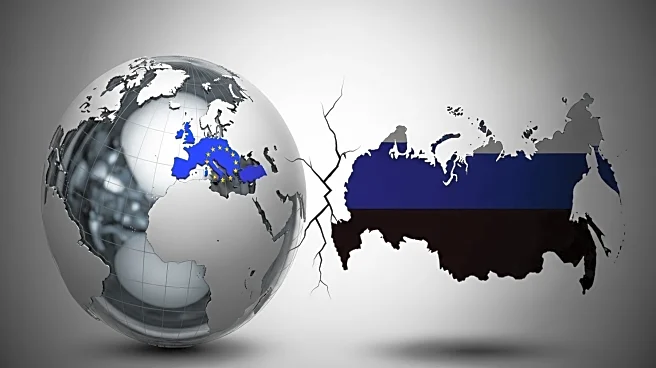What's Happening?
The European Union has summoned the Russian envoy in Brussels after a missile strike severely damaged the EU's delegation in Kyiv. High Representative Kaja Kallas announced the decision, emphasizing that diplomatic missions should not be targeted. The attack involved 629 missiles and drones, resulting in 17 deaths, including four children, and significant destruction across Kyiv. Despite the damage, the EU delegation remains operational. The British Council in Kyiv was also affected, prompting the UK to summon the Russian ambassador. The Vienna Convention of 1961 mandates protection for diplomatic premises, but such buildings are often impacted during conflicts. EU Commission President Ursula von der Leyen expressed outrage and confirmed no delegation members were harmed.
Why It's Important?
This incident underscores the escalating tensions between Russia and the European Union amid the ongoing conflict in Ukraine. The attack on diplomatic premises highlights Russia's disregard for international norms, potentially straining diplomatic relations further. The EU's response, including potential sanctions and mobilization of frozen Russian assets, indicates a firm stance against Russia's actions. The situation impacts international diplomacy, with potential repercussions for global peace efforts and security policies. The EU's actions may influence other nations' responses to Russia's aggression, affecting geopolitical dynamics and international law adherence.
What's Next?
The EU plans to introduce a 19th package of sanctions against Russia, aiming to tighten restrictions on its war capabilities. Additionally, the bloc is considering using frozen Russian Central Bank assets to support Ukraine's defense and reconstruction. Ursula von der Leyen's discussions with Ukrainian President Volodymyr Zelenskyy and US President Trump suggest coordinated international efforts to address the crisis. The EU's diplomatic and economic measures could lead to further isolation of Russia, impacting its economy and international standing. The situation may prompt increased diplomatic engagements and negotiations to seek resolution.
Beyond the Headlines
The attack on the EU delegation raises ethical and legal questions about the protection of diplomatic missions during wartime. It challenges the effectiveness of international conventions like the Vienna Convention in safeguarding diplomatic entities. The incident may lead to discussions on strengthening international laws and protocols to prevent such occurrences. Additionally, the EU's potential use of frozen assets for Ukraine's benefit could set a precedent for handling similar situations in future conflicts, influencing global financial and legal practices.









